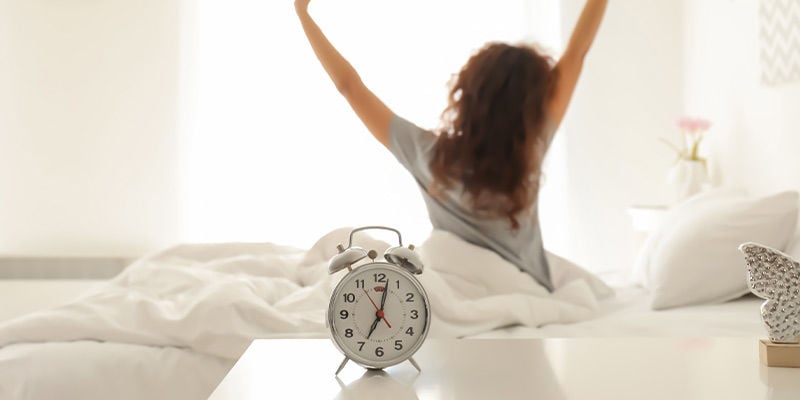
How To Make Sleeping A Habit
The power of routine and habit has been known and celebrated for millennia. And it can be applied to sleep as well! Here we explain the importance of forming a sleeping habit, and share 6 helpful tips to set you up for success!
Sleep, it should not surprise you, is very important! Regarded by some as an unnecessary indulgence, this function is actually key to both our survival and happiness. Don’t take it for granted.
As with many things in life, routine is very beneficial when it comes to sleep. In this article, we look at how to form an effective and relaxing sleep habit.
What makes a sleeping habit?

A sleep habit is, at its core, just about forming a reliable routine around sleep. Principally, it involves going to bed and waking up at more or less the same time, pretty much every day. While this alone can be enough to improve sleep, improving other sleep habits, or sleep-related habits and sleep hygiene, will also improve sleep quality, and will make sticking to your routine easier!
Why is a sleeping habit so important?
If you form a sleep habit, you’ll find that your body adjusts to get the amount of sleep it needs per night, which in turn will make your day-to-day quality of life richer, and will help to avoid a range of conditions that are thought to be worsened by sleep deprivation.
For many people, getting enough sleep without a habit or routine is pretty difficult. Not only do some people fail to get enough sleep, but others may sleep too much, which can also adversely affect quality of life. Although, too much sleep is probably much better than too little!
What causes disruption to a sleeping habit?

There are very many things in the world that can disrupt sleep, and soon we’ll go on to give advice on how to avoid and manage some of them. Examples include:
- Stress
- Anxiety
- Children
- Noise from neighbours/flatmates
- Jet lag
- Caffeine
- Alcohol
- Other drugs
- Screens
- Poor sleep hygiene
- Poor sleeping habits
- A snoring partner or roommate
- Insomnia
- Nightmares
- The list goes on!
Sleep is precious, and managing a good sleeping environment, especially in the modern world, can indeed be challenging. However, if you can do it, it can really improve your quality of life.
What are bad sleeping habits?
Many people have bad sleeping habits. The two major bad habits are staying up too late and getting up too early. Although, can one exist without the other?
Other bad habits include random bedtimes and waking times, or using screens right up until bed. Some people even check their phones if they wake up during the night, which is sure to disrupt sleep!
How to make sleeping a habit

If you feel that you’re not getting enough out of sleep, you could surely benefit from forming a sleeping habit. Forming a habit takes a little time and, most importantly, commitment and consistency. It’s not a habit if you don’t do it habitually!
Here are six tips to get you on the right track.
Try to sleep and wake up at the same time every day
Establishing a concrete routine is the number one way to improve your quality of sleep. Go to bed and wake up at the same time every day. Do this, and you’ll fall asleep more easily, wake up more easily, and will feel better for it!
In order to lock in a routine, you might need to be brutal with yourself for a day or two, especially if you’re struggling to fall asleep at an early enough time. Set an alarm for the time you want to get up, and stick to it in the morning even if you haven’t had enough sleep. A few days of this routine will cause your circadian rhythm to quickly readjust, and you’ll find yourself drifting off comfortably at an earlier time, and waking up naturally at your desired time, all while feeling refreshed.
Be careful with napping
Different people have very different relationships with napping. Some can do it, others can’t at all. For some people, napping in the day can disrupt sleep at night. If you think this is true for you, avoid napping, or try to do it early in the afternoon. Napping in the late afternoon or evening can prevent you from comfortably falling asleep.
Avoid sleeping in, even at the weekends

As wonderful as it seems, lie-ins can have a detrimental effect on sleep routines. Although, if your routine is resting you properly, you shouldn’t feel the need to lie in. If you find that you’re sleeping for a few extra hours without an alarm, it’s probably a sign that you’re not getting enough sleep during the week.
However, if you are, and you’re just good at sleeping, consider setting alarms even at weekends, as this will maintain your sleeping habit.
Limit the use of electronics before sleep
Keep away from screens before bed, especially phones and laptops. At a distance of around 200cm, televisions are less of a problem, but they can still cause some disruption. The blue light in modern screens tells the brain that the sun is still up and stops the brain from producing melatonin—a hormone that tells the body to sleep.
Having a screen-free hour or two before bed makes it much easier to fall asleep, and improves quality of sleep too!
Watch what you eat and drink
A full stomach might feel relaxing, but it can actually disrupt sleep. If the stomach is busy digesting, it can be harder for the brain and body to shut down. Eating a few hours before bed can really help with falling asleep and staying asleep.
Even more important, limit caffeine and alcohol consumption. Caffeine should be avoided at all times in the afternoon, as it takes a long time to metabolise. Alcohol, likewise, should be avoided most of the time. Though it may make falling asleep easier, it makes staying asleep more difficult and it ruins sleep quality.
Check out the 10-3-2-1-0 method
The 10-3-2-1-0 method is an easy way to form a routine, encapsulating everything already mentioned. Each number refers to an amount of hours. Here’s a brief overview:
- 10: This is the amount of hours before bedtime that you should not consume caffeine.
- 3: Don’t eat or drink alcohol for the three hours before bed.
- 2: Don’t work for at least two hours before bed (though much longer is better!).
- 1: Don’t look at a screen for at least an hour before bed.
Form a harmonious sleeping habit today

Forming a sleep habit takes a little commitment, but it isn’t so difficult. The difficulty really comes from the conflict between this new habit and existing ones—such as using phones up until the moment we go to bed. So, forming a sleep habit is as much about adjusting priorities as anything else.
If you manage it, though, you’ll be very grateful for yourself for the effort. And if you need a little help on your way, check out the Zamnesia Healthshop’s range of supplements!
-
 4 min
10 March 2023
Why Sleep Is Vital For The Brain
Getting enough quality sleep is fundamental to our mental and physical health. It's not just about feeling awake and productive during the day—a decent amount of good sleep is key to leading a...
4 min
10 March 2023
Why Sleep Is Vital For The Brain
Getting enough quality sleep is fundamental to our mental and physical health. It's not just about feeling awake and productive during the day—a decent amount of good sleep is key to leading a...
-
 1 min
6 November 2017
Best Incense For Relaxation And Sleep
Here at Zamnesia, we bring you all sorts of herbs. Herbal incense is a safe and cost-effective way to unwind. Discover our best varieties of incense for easing the mind, body and soul.
1 min
6 November 2017
Best Incense For Relaxation And Sleep
Here at Zamnesia, we bring you all sorts of herbs. Herbal incense is a safe and cost-effective way to unwind. Discover our best varieties of incense for easing the mind, body and soul.





 United States
United States











